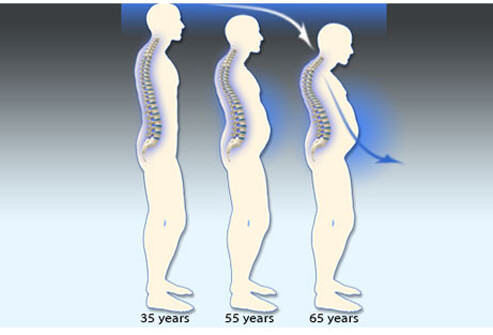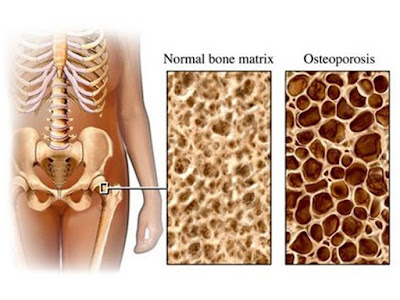What is Osteoporosis?
Osteoporosis, which means "porous bones," is a disease that thins and weakens your bones, making them fragile and more likely to break. It is sometimes called a "silent disease" because it can develop gradually over many years without causing any symptoms. You may be able to reduce or delay bone loss and you can treat osteoporosis, but you may not be able to prevent it.
Although men can suffer from osteoporosis, the vast majority of individuals affected by osteoporosis are women. In fact, the annual number of osteoporotic fractures in women is greater than the number of heart attacks, strokes and cases of breast cancer combined. Women are four times more likely to develop osteoporosis than men.
Risk Factors:
Common risk factors for osteoporosis are:
- Small, thin frame (weighing less than 127 pounds)
- Personal and/or family history of broken bones or stooped posture in adulthood
- Previous history of osteoporotic fractures of the spine, hip or wrist
- Low lifetime intake of calcium
- Excessive thinness
- Smoking
- Excessive alcohol consumption ("Moderate drinking" for women and older people is defined by the National Institute on Alcohol Abuse and Alcoholism as one drink per day one drink equals: a 12 ounce bottle of beer (5 percent alcohol) , one 5-ounce glass of wine (12 percent alcohol), or 1.5 ounces of 80-proof distilled spirits. Moderate drinking is considered safe.)
- Inactive lifestyle
- Estrogen deficiency caused by menopause and certain medical conditions such as athletic amenorrhea, anorexia nervosa and treatment with medications that lower estrogen levels
- Absence of menstrual periods or irregular menses as a young woman
- Long-term use of some anticonvulsants and corticosteroids
- Caucasian or Asian ethnic backgrounds, but African-Americans and Hispanic Americans are also at significant risk.
- Certain chronic medical conditions including diabetes, hyperthyroidism, hyperparathyroidism, some bowel diseases and rheumatoid arthritis
- Depression. People with serious depression have increased rates of bone loss, as do people who take selective serotonin reuptake inhibitor (SSRI) antidepressants. More research is necessary to better understand the associations between depression and SSRIs and bone loss.
- Use of proton pump inhibitors. The Food and Drug Administration (FDA) requires safety information on the labels of prescription and over-the-counter labels for proton pump inhibitors about a possible increased risk of fractures to the hip, wrist and spine for people using these medications. Proton pump inhibitors are used to treat a variety of gastrointestinal disorders. They are generally prescribed for a two-week course and are not to be used more than six weeks in a year. In observational studies, the risk rises with prolonged use and high doses of proton pump inhibitors. Further study is needed to verify any increased risk of fractures.
Prevention
The importance of beginning bone loss prevention at a very young age is now well understood. Bone health programs are being developed and implemented that target girls as young as nine to 12 years of age and their parents, focusing on promoting good nutritional choices and participating in regular physical activity.
Nearly one-third of bone loss can occur before a diagnosis of osteoporosis is made. However, you can prevent future bone loss caused by osteoporosis with early detection. Also, once you've had a fracture due to osteoporosis, your risk of future fractures is increased.
Thus, it is important to prevent the first fracture. Taking preventive steps and reviewing risk factors now are especially helpful approaches for women of all ages.
There are five simple steps to reduce your risk for osteoporosis:
- Increase the amount of calcium and vitamin D in your diet.
- Exercise regularly; bones and muscles respond to physical activity by becoming stronger. Weight-bearing exercises like walking and weight lifting are the most beneficial.
- Maintain a healthy body weight. Being underweight or losing weight increases your risk of bone loss and fracture, and ultimately, of developing osteoporosis.
- Quit smoking. Cigarette smoking (nicotine) can reduce bone mass and increase the risk of fracture, thus increasing your risk for osteoporosis. Ask your health care professional to recommend methods to help you quit.
- Drink alcohol in moderation, if you drink. Excessive consumption of alcohol increases your risk of osteoporosis and fractures from falls.
For some women, medication may also be helpful for preventing additional bone loss. Ask your health care professional what the best osteoporosis prevention strategy is for you.
Dietary Strategies for Osteoporosis Prevention
Many vitamins and minerals are important to maintaining healthy bones. That is why it is important to eat a well-balanced diet every day consisting of a variety of foods, including grains, fruits, vegetables, nonfat or low-fat dairy foods or other calcium-rich foods, as well as meat and beans.
Most Americans do not get enough calcium in their diets so adding calcium to your diet may be the easiest health-related change you can make. It's an important one, too. Calcium may reduce fractures caused by osteoporosis by as much as 50 percent. The National Osteoporosis Foundation recommends these calcium guidelines based on age:
- Girls ages nine to 18: 1,300 mg/calcium/daily
- The average woman age 19 to 50: 1,000 mg/calcium/daily
- Women 51 or older: 1,200 mg/calcium/daily.
If you have asthma, allergies, a thyroid condition or other chronic medical condition, you may need an even higher daily calcium intake. Your intake should not exceed 2,000 mg/day, however.
Good sources of calcium include:
- Low-fat or nonfat dairy products, such as milk, yogurt and cheese. Three eight-ounce glasses of milk plus calcium from a normal diet will meet daily calcium requirements.
- Dark green, leafy vegetables such as broccoli, collard greens, bok choy and spinach
- Sardines and salmon with bones
- Fortified tofu (a soybean product made from curdled soy milk)
- Soy milk
- Almonds
- Calcium-fortified foods and beverages such as orange juice, cereals and breads
Difficulty digesting milk, which is called lactose intolerance, and stomach upset caused by dairy products may be more common as you age. If that's the case, yogurt with active cultures, buttermilk, and cheddar and Swiss cheeses are high in calcium but low in lactose, the sugar found in milk and milk products.
Many people mistakenly believe they are lactose intolerant when a simple sensitivity to dairy products or some other food substance is really the case. So check with your health care professional before you avoid dairy products. Products that don't contain lactose (such as Lactated) can help people with lactose intolerance to consume dairy products.
When your diet doesn't provide enough calcium, you may wish to take calcium supplements. You shouldn't take calcium supplements you do not need, however. Calcium supplements are available by prescription and over the counter. Always talk to your health care professional before you take any new supplement, including calcium.
Copyright: Lightning Tech.
Copyright: Lightning Tech.








2 Comments
I am very much happy to share to every viewers that is reading this,I want to inform the whole public of how I got help for my herpes, I wanted this since 6 months ago, I have also taken treatment from some doctor,few weeks back I came on the net to see if I will be able to get any information as to cure my herpes, on my search I saw various testimony of people who was helped by a great man called Dr Akhigbe and without any hesitation, I contacted him, I wrote to him and and he guided me, I asked him for solutions and he started the remedies for me and indeed 3 weeks after I started using the medicine, I was completely happy as it worked for me.I went to the hospital for check up and indeed I was declared negative from my disease, and I also waited again for two weeks and went back to another hospital for check up to be fully sure and to my great surprise I was still declared negative, and I decided to share this great opportunity to those people out there fighting this sickness, You can contact him now for your medicine to cure your diseases, contact his Email; drrealakhigbe@gmail.com or Whatsapp +2349010754824 website. hpps:drrealakhigbe.weebly.comDr Akhigbe also cure diseases like..
ReplyDeleteHIV, Herpes , Cancer, Chronic Disease, Asthma , Parkinson's disease, External infection, Als, progeria, common cold, multiple sclerosis disease, Nausea, Vomiting or Diarrhea, Heart Disease, meningitis, Diabetes, Kidney Disease, Lupus, Epilepsy, Stroke,Eczema, Erysipelas Eating Disorder, Back Pain. Osteoporosis etccontact him for your solution.
I am very much happy to share to every viewers that is reading this,I want to inform the whole public of how I got help for my herpes, I wanted this since 6 months ago, I have also taken treatment from some doctor,few weeks back I came on the net to see if I will be able to get any information as to cure my herpes, on my search I saw various testimony of people who was helped by a great man called Dr Akhigbe and without any hesitation, I contacted him, I wrote to him and and he guided me, I asked him for solutions and he started the remedies for me and indeed 3 weeks after I started using the medicine, I was completely happy as it worked for me.I went to the hospital for check up and indeed I was declared negative from my disease, and I also waited again for two weeks and went back to another hospital for check up to be fully sure and to my great surprise I was still declared negative, and I decided to share this great opportunity to those people out there fighting this sickness, You can contact him now for your medicine to cure your diseases, contact his Email; drrealakhigbe@gmail.com or Whatsapp +2349010754824 website. hpps:drrealakhigbe.weebly.comDr Akhigbe also cure diseases like..
ReplyDeleteHIV, Herpes , Cancer, Chronic Disease, Asthma , Parkinson's disease, External infection, Als, progeria, common cold, multiple sclerosis disease, Nausea, Vomiting or Diarrhea, Heart Disease, meningitis, Diabetes, Kidney Disease, Lupus, Epilepsy, Stroke,Eczema, Erysipelas Eating Disorder, Back Pain. Osteoporosis etccontact him for your solution.